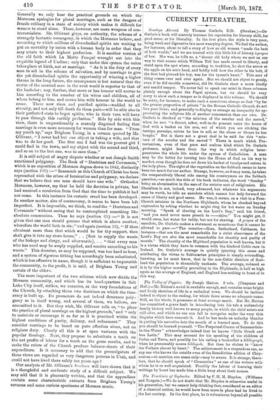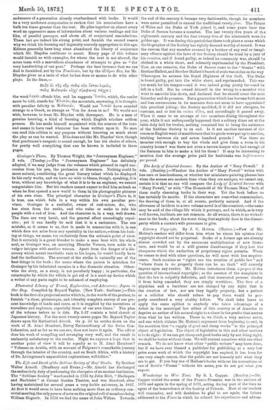The Trachinhe of Sophocles. Edited by F. H. M. Maples.
(Williams and Norgate.)—We do not doubt that Mr. Blaydes is otherwise useful in his generation, but we cannot help thinking that, considered as an editor of a classical author, he would have been more in place had he lived in the last century. In the first place, he is voluminous beyond all poasiblo endurance of a generation already overburdened with books. It would be a very moderate computation to reckon that his annotations have a bulk ten times greater than the text. He piles together on almost every word an oppressive mass of information about various readings and the like, of parallel passages, and above all, of conjectural emendations. These last are indeed his strong point, and furnish the second reason why we think his learning and ingenuity scarcely appropriate to this age. Editors generally have long since abandoned the liberty of conjecture which Mr. Blaydes continues to assert. Every page of this volume would furnish us with examples, for where the text is not altered, the notes teem with a marvellous abundance of attempts to give us "the very handwriting of our poet." Perhaps the best instance that we can find is furnished, not by the Trachinice, but by the CEdipus Rex, for Mr. Blaydes gives us a taste of what he has done or means to do with other plays. In the lines,— BA5 rob ox ceraz
vto70; lizAccipeuv mix/ etplawo; 7cixa ; the word Xilkiv offends him, and he suggests 'Xize.a, which, the reader must be told, stands for 'EX/xe4, the mountain, answering, it is thought, with peculiar felicity to Ktgarpuiv. Would not 'Xixt:n, have sounded strange to a Greek, as strange as 'Von for Avon to us ? We would not wish, however, to treat 3Ir. Blaydes with disrespect. He is a man of genuine learning, a kind of learning which English scholars seldom possess. He has made himself acquainted with the sources of the text, and seems to have read whatever has been written upon it. No man can read this edition to any purpose without knowing as mach about the play as can be wanted. If he does not like Mr. Maples' view, though that gentleman's exegesis is sound enough, he has his choice of others, for pretty well everything that can be known is included in these pages.



































 Previous page
Previous page